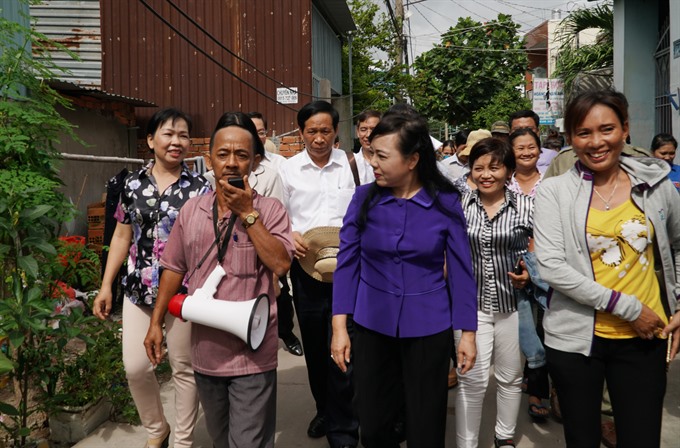 Society
Society

Nguyễn Văn Đức, a volunteer with a dengue-fever prevention team in District 12’s Hiệp Thành Ward, takes a walk around his residential quarter three times a week with a handheld loudspeaker, calling on residents to throw away containers that could be breeding grounds for mosquitoes.
 |
| Nguyễn Văn Đức, a volunteer with a dengue-prevention team in District 12’s Hiệp Thành Ward, uses a handheld loudspeaker to call on local residents to clean away waste and used tyres that could be breeding grounds for mosquitoes.—VNA/VNS.Photo.Phương Vy |
HCM CITY — Nguyễn Văn Đức, a volunteer with a dengue-fever prevention team in District 12’s Hiệp Thành Ward, takes a walk around his residential quarter three times a week with a handheld loudspeaker, calling on residents to throw away containers that could be breeding grounds for mosquitoes.
Đức and his team visit each household once a week, looking for mosquitoes or larvae in tyres or other containers that could be filled with water. If containers with larvae are found, the team issues an official warning to clear it away, and then returns later to check the site.
In May, when the number of dengue fever cases rose in the ward, the local People’s Committee asked all of the ward’s residential quarters to set up teams composed of the heads of the quarters, local women’s unions and volunteers.
In July, the ward recorded 30 fewer cases than in either May or June, which saw a combined total of 156.
During her visit to District 12 on July 29, Minister of Health Nguyễn Thị Kim Tiến praised the ward for setting up the teams and encouraged other districts to do the same.
At a meeting between the city’s Department of Health and district health centres, Dr Nguyễn Hữu Hưng, the department’s deputy head, said that local health officials and authorities should study District 12’s methods, noting that District 8 had also used effective dengue-prevention measures.
The district was a hotspot for dengue fever in 2015 and 2016, according to Dr Nguyễn Thị Hồng Biên, deputy head of District 8’s Health Centre.
However, this year the district was not included on the list of areas with the highest incidences of the disease, she said.
This year the district People’s Committee set up a team, including the vice chairman of the committee as the leader, to complete monthly checks of all polluted areas including canals and other sites at a high risk for spreading dengue fever via mosquitoes.
“When the team visits these sites, its leader assigns local authorities to work with the district Public Welfare and Service Company to clean standing water and debris within one to two weeks,” she said.
Local authorities are fined if garbage and pollution are detected after the two-week period.
Owners of empty houses and construction sites are also required to commit that they will clean water and rubbish containers that could be home to mosquito larvae.
Local authorities are in charge of cleaning waste at empty houses and construction sites without owners and erecting sheet metal fences to prevent residents from throwing waste into the areas.
Biên of District 8 said that more than 2,000 families were using jars common in rural areas in the Mekong Delta to store water. Local authorities are responsible for instructing residents in clearing away larvae in water.
Hưng pointed out that preventive measures must be done frequently and that local authorities and health officials should co-ordinate efforts to improve the efficacy of the measures.
However, the most important action would be to increase fines on violators, he said, adding that several districts had ignored the fines.
In the first half of the year, fines were handed out in 75 cases in which containers with larvae were found.
Since early this year, HCM City has recorded 11,200 dengue fever incidences, an increase of 24 per cent compared to the same period last year, with a total of four deaths.
Substandard services
Many companies on the internet advertise their services to destroy insects, including mosquitoes, but many are substandard, according to the city’s Preventive Health Centre.
A number of the companies use pesticides used to protect plants or chemicals belonging to the carbamate group, leading to environmental pollution and resistance against certain chemicals.
Residents should choose services that use standards described by the Department of Health on its website, according to the Preventive Health Centre. — VNS




